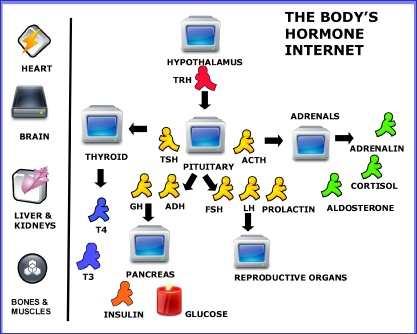www.thetinman.org Copyright © All rights reserved.

Disclaimer: The material presented in this site is intended for public educational purposes only. The author is not offering medical or legal advice. Accuracy of information is attempted but not guaranteed. Before undertaking any diet, or health improvement program, you should consult your physician. The author is in no way liable or responsible for any bodily harm, physical, mental or emotional state of any patient reacting to any of the content on this site. Thetinman.org has not examined, reviewed or tested any product or service mentioned herein. We are not being paid to advertise or promote any product or service mentioned herein. The links are offered strictly as examples of resources available. The site assumes no responsibility or liability of any kind related to the content of external sites or the usage of any product or service referenced. Links to external sites were live at the time of creation of the link. Thetinman.org does not create content for or manage external sites. The information can be changed or removed by the external site’s administrators at any time and they are responsible for the veracity of their information. Links are provided to support our data and supply additional resources. Please report broken links to administrator@thetinman.org. Thetinman.org is not a charitable foundation. It neither accepts nor distributes donations or funds of any kind.


DIABETES & PANCREAS FUNCTION
Glucose is an important carbohydrate in biology. Cells use it as a secondary source of energy and a metabolic intermediate.
This test can be helpful in screening for diabetes, acute stress, Cushing syndrome, acute pancreatitis, hypothyroidism, hypopituitarism, Addison’s disease, and liver disease.
Glycated albumin is found in diabetes. Albumin transports thyroid hormones.
Hemoglobin A1C (glycated hemoglobin test) is a diagnostic indicator for diabetes (Type 1, 1.5, and 2) and determines how well diabetes is being controlled by providing an average of blood sugar control over a six to twelve week period.
Insulin is produced in beta cells in the islets of Langerhans in the pancreas and regulates the metabolism of carbohydrates and fats. It promotes the absorption of glucose by skeletal muscles and fat tissue and removes excess (toxic levels) of glucose from the blood. When blood glucose levels fall below a certain level, the body breaks down the glycogen stored in the liver and muscles into glucose.
In Type 1 diabetes, the beta cells no longer produce sufficient insulin. In Type 2 diabetes, the cells become resistant to insulin and are unable to use it effectively. Latent autoimmune diabetes of adults (LADA) Type 1.5 is caused by failure of the islets to produce insulin and has some cell resistance. Diabetes is associated with up to thirty percent of cases of stiff-person syndrome.
This test is useful in screening for tumors of the islets of Langerhans, hypoglycemia, diabetes, hypopituitarism, and Cushing syndrome.
C-peptide is created in the pancreas and has a longer half-life than insulin and the level correlates with insulin levels in the blood.
C-peptides more accurately reflect islet cell function in patients treated with insulin and to distinguish Type 1/1.5 and Type 2 diabetes. Type 1 patients have a low levels of insulin and c-peptides. Type 1.5 have low to moderate levels. In Type II, there is greater likelihood of a high level of C-peptides. It is also useful in screening for renal failure.
Pancreas antibody tests are used in early diagnosis for type 1 diabetes, differential diagnosis between type 1.5 (LADA) and type 2 diabetes, as well as for differential diagnosis of gestational diabetes, risk prediction in immediate family members for type 1, and to monitor prognosis of the clinical progression of type 1 diabetes.
Insulin Autoantibodies (IAA) Of the major islet antigens, proinsulin and glutamate decarboxylase (GAD) are currently the best candidates as primary autoantigens that lead to beta cell destruction and type 1 diabetes. Autoantibodies to insulin are often the first to be detected in young children at increased genetic risk of type 1 diabetes. Proinsulin, unlike GAD is expressed almost exclusively in beta cells. It correlates with the specific targeting of beta cells by T-cells infiltrating the pancreatic islets. The very high frequency of insulin autoantibodies (IAA) found in young children at diabetes onset shows that loss of tolerance to proinsulin is common in those who progress rapidly.
IA2 Autoantibodies (previously known as ICA512) are tyrosine phosphatase-related islet antigens. Tyrosine is found in neural tissue and cells of the pancreatic islets. The IA2 autoantibodies generally develop later in the process leading to type 1 diabetes and is associated with more rapid progression. These antibodies do not persist as long following diagnosis as GAD65. They are less common in patients who are diagnosed with type 1.5 diabetes so are less useful than GAD65 for defining diabetes in longer term or older patients.
ZnT8 antibody test is new. SLC30A8 is a gene that codes for zinc tranporters related to insulin secretion and regulates liver insulin clearance. This test is useful in screening for type 2 diabetes.
GAD65 antibody test is used to determine if a patient has type 1 diabetes or type 1.5 (LADA).
Anti-GAD65 antibodies are found in 70 - 80% of T1 and T1.5 diabetes patients and in 60-80% of SPS patients.Type 1 diabetes patients show values of less than or equal to 20 IU/ml (ELISA) whereas SPS patients showed values of greater than or equal to 20 IU/ml. A tiny fraction of T1 or T1.5 diabetes patients will go on to have SPS symptoms. However, one-third of SPS patients have co-existing metabolic autoimmune diseases.
In type 1 diabetes, the epitopes found were aa161-233 and aa473-555. In SPS, the epitopes found were aa81-171 and aa313-403. So they are similar, but not the same.
There are three ways to measure GAD65 antibodies: radio-immune assay (RIA), radiobinding assay (RBA) and enzyme-linked immunosorbent assay (ELISA). Labs develop their own reference ranges and results may vary by location.
RIA levels of GAD65: [Source: Mayo Clinic]
For type 1 diabetes (and to differentiate from type 2 diabetes), thyroiditis, pernicious anemia, titers are generally < or =0.02 nmol/L.
For stiff-person syndrome, autoimmune encephalitis, cerebellitis, brainstem encephalitis, and myelitis, titers are generally > or =0.03 nmol/L.
For myasthenia gravis, Lambert-Eaton Syndrome, and dysautonomia, titers are < or =0.02 nmol/L.
ELISA levels of GAD65 [Source: Genway/Mayo Clinic/Athena Labs]
Negative = <5.0 IU/mL
Positive = > 5.0 IU/mL
RBA levels of GAD65 [Source: Quest]
Negative = ≤1.0 U/mL
Positive = >1.0 U/mL
Anti-GAD65 levels are present in most patients with stiff-person syndrome, however they are not present in all patients with SPS. In multiple studies, the levels of the antibody have not correlated with symptom severity or progression of the disease.
For more information on these tests, visit Quest Labs.
ADRENAL FUNCTION
ACTH (also called the cosyntropin test, tetracosactide test or Synacthen test) is used to assess the functioning of the adrenal glands stress response by measuring the adrenal response to adrenocorticotropic hormone (ACTH) and the anterior pituitary gland function.
Corticotropin-releasing hormone (CRH) is made in the hypothalamus and stimulates ACTH production in the anterior pituitary gland. This in turn stimulates the adrenal cortex to to produce cortisol and dehydroepiandrosterone (DHEAS) creating a feedback loop to the hypothalamus.
This is helpful in screening for Addison’s disease, Cushing syndrome, hypopituitarism, adrenal tumor, or secondary adrenal insufficiency.
Aldosterone is produced by the adrenal cortex in the adrenal gland. It helps regulate blood pressure. It is stimulated by ACTH, low serum sodium levels, and high serum potassium.
This test is helpful in screening for adrenal adenoma, adrenal hyperplasia, stress, and Cushing syndrome,.
Cortisol (Free) coordinates the functions of the hypothalamus, pituitary gland, and adrenal glands.
Cortisol is excreted from the adrenal gland. Cortisol levels rise and fall throughout the day, peaking in the morning between 6 and 8 a.m. and gradually falling until midnight. An early sign of adrenal hyperfunction is the loss of diurnal variation, even though the cortisol levels are not elevated. Samples should be collected at 8 am and 4 pm, but often only the a.m. cortisol is measured.
Cortisol a.m. (serum) is the most common test, but is not the always the best measure of function.
Cortisol (Total) (urine is collected over a 24 hour period.).
Cortisol (24 hour) 4 samples. Samples are collected four times: morning, noon, evening, and night. This can be urine or sputum samples. A graph is generated charting the production of cortisol over the course of the day.
Cortisol levels are useful for screening for Cushing syndrome, adrenal adenoma or carcinoma, hyperthyroidism, obesity, stress, adrenal hyperplasia, hypopituitarism, hypothyroidism, and liver disease.
DHEA (androstenediones) are the precursors of testosterone and esterone and are made in the gonads and adrenal glands.
This test is useful in screening for adrenal tumors, Cushing syndrome, gonadal failure, and primary or secondary adrenal insufficiency.
SEX HORMONES
Estradiol (Estrogen) is the most potent estrogen produced primarily in the ovary.
It is useful in screening for ovarian tumors, testicular tumors, adrenal tumors, cirrhosis, hyperthyroidism, hypopituitarism, pregnancy, and menopause. This can be a blood test or 24 hour urine collection.
Progesterone is an endogenous steroid hormone involved in the menstrual cycle, pregnancy, and embryogenesis.
It is useful in screening for adrenal malfunction, ovulation, pregnancy, toxemia, ovarian tumor, amenorrhea, and ovarian failure.
Testosterone is an anabolic steroid secreted primarily by the testicles and ovaries. Small amounts are also secreted by the adrenal glands. It is a factor in muscle mass and strength, increased bone density and strength, and stimulation of linear growth and bone maturation. It also affects the maturation of the sex organs.
This test is useful in screening for encephalitis, adrenal hyperplasia, adrenocortical tumor, testicular tumor, hyperthyroidism, hepatic cirrhosis, and ovarian tumor.
For more information on these tests, visit Quest Labs.

ENDOCRINE PANEL
Disclaimer: The material presented in this site is intended for public educational purposes only. The author is not offering medical or legal advice. Accuracy of information is attempted but not guaranteed. Before undertaking any diet, or health improvement program, you should consult your physician. The author is in no way liable or responsible for any bodily harm, physical, mental or emotional state of any patient reacting to any of the content this site. Thetinman.org has not examined, reviewed or tested any product or service mentioned herein. We are not being paid to advertise or promote any product or service mentioned herein. The links are offered strictly as examples of resources available. The site assumes no responsibility or liability of any kind related to the content of external sites or the usage of any product or service referenced. Links to external sites were live at the time of creation of the link. Thetinman.org does not create content for or manage external sites. The information can be changed or removed by the external site’s administrators at any time and they are responsible for the veracity of their information. Links are provided to support our data and supply additional resources. Please report broken links to administrator@thetinman.org.